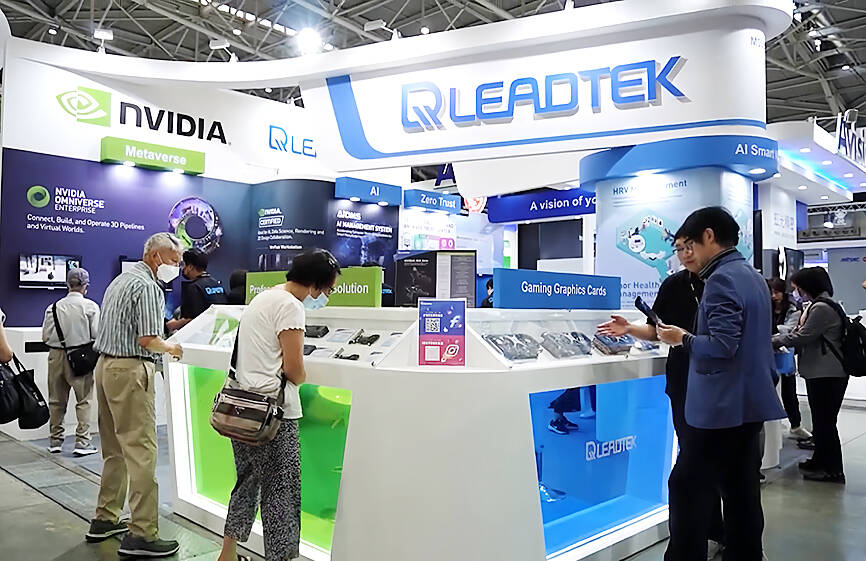Leadtek Research Inc (麗臺), a graphics card and artificial intelligence (AI) workstation and server supplier, yesterday said revenue in the second half of this year is likely to be flat from the first half, hinging on shipments of Nvidia Corp’s graphics cards.
Leadtek is a long-term partner of Nvidia and an authorized reseller of the US chipmaker’s products under its own brand following customized manufacturing and redesigning.
The company’s revenue in the first half reached NT$1.56 billion (US$51.9 million), down 6.2 percent from the same period last year and 40.83 percent from the second half of last year.

Photo courtesy of Leadtek Research Inc
The revenue decline was due to delayed shipments of Nvidia graphics cards, which only entered mass production last month and have had shipments slowed down this month, a Leadtek official told the Taipei Times by telephone.
The company expects Nvidia’s shipping schedule for its RTX 50-series graphics cards, typically used for gaming and video editing, to return to normal and stabilize in the second half, the official said on condition of anonymity.
Leadtek is also banking on its products equipped with the RTX PRO 6000 series graphics cards, which have been verified by Nvidia, the official said.
Shipments of such products to clients are expected to begin next month, with larger volumes projected for next quarter, but eventual deliveries still depend on Nvidia’s graphics card supply, they said.
The RTX PRO 6000 is usually used for professional purposes, such as training AI models for inferencing ability and producing medical images.
A sharp appreciation of the New Taiwan dollar against the US dollar resulted in about NT$10 million to NT$20 million in foreign-exchange losses in the second quarter, although the impact was limited by the company’s natural hedging strategy, the official said.
In addition, Leadtek purchases graphics cards from Nvidia by paying in US dollars, and when the company sells the redesigned products to its customers, mainly in China, it gets payments in US dollars as well, which partly offsets exchange rate fluctuations, the official said.
The company expects no foreign exchange loss this quarter, they added.
Besides graphics cards, and AI workstations and servers, Leadtek also produces virtual desktop systems and smart healthcare devices.
Although tariffs on its main products remain uncertain pending the outcome of a Section 232 investigation under the US Trade Expansion Act of 1962, Leadtek expects little impact, as US shipments are limited to virtual PC products and the market makes up only 7 percent of its sales, the official said.
Virtual PC products refer to computer terminals that rely on a central server for most computing tasks, with limited local processing and storage capacity.
Graphics cards made up about 90 percent of the company’s sales last quarter, while virtual PC products contributed about 8 percent, it said.

Nvidia Corp chief executive officer Jensen Huang (黃仁勳) on Monday introduced the company’s latest supercomputer platform, featuring six new chips made by Taiwan Semiconductor Manufacturing Co (TSMC, 台積電), saying that it is now “in full production.” “If Vera Rubin is going to be in time for this year, it must be in production by now, and so, today I can tell you that Vera Rubin is in full production,” Huang said during his keynote speech at CES in Las Vegas. The rollout of six concurrent chips for Vera Rubin — the company’s next-generation artificial intelligence (AI) computing platform — marks a strategic

REVENUE PERFORMANCE: Cloud and network products, and electronic components saw strong increases, while smart consumer electronics and computing products fell Hon Hai Precision Industry Co (鴻海精密) yesterday posted 26.51 percent quarterly growth in revenue for last quarter to NT$2.6 trillion (US$82.44 billion), the strongest on record for the period and above expectations, but the company forecast a slight revenue dip this quarter due to seasonal factors. On an annual basis, revenue last quarter grew 22.07 percent, the company said. Analysts on average estimated about NT$2.4 trillion increase. Hon Hai, which assembles servers for Nvidia Corp and iPhones for Apple Inc, is expanding its capacity in the US, adding artificial intelligence (AI) server production in Wisconsin and Texas, where it operates established campuses. This

US President Donald Trump on Friday blocked US photonics firm HieFo Corp’s US$3 million acquisition of assets in New Jersey-based aerospace and defense specialist Emcore Corp, citing national security and China-related concerns. In an order released by the White House, Trump said HieFo was “controlled by a citizen of the People’s Republic of China” and that its 2024 acquisition of Emcore’s businesses led the US president to believe that it might “take action that threatens to impair the national security of the United States.” The order did not name the person or detail Trump’s concerns. “The Transaction is hereby prohibited,”

Garment maker Makalot Industrial Co (聚陽) yesterday reported lower-than-expected fourth-quarter revenue of NT$7.93 billion (US$251.44 million), down 9.48 percent from NT$8.76 billion a year earlier. On a quarterly basis, revenue fell 10.83 percent from NT$8.89 billion, company data showed. The figure was also lower than market expectations of NT$8.05 billion, according to data compiled by Yuanta Securities Investment and Consulting Co (元大投顧), which had projected NT$8.22 billion. Makalot’s revenue this quarter would likely increase by a mid-teens percentage as the industry is entering its high season, Yuanta said. Overall, Makalot’s revenue last year totaled NT$34.43 billion, down 3.08 percent from its record NT$35.52